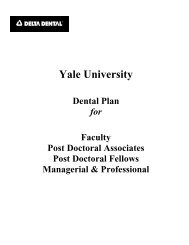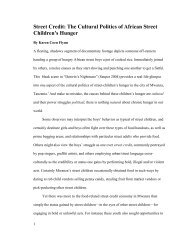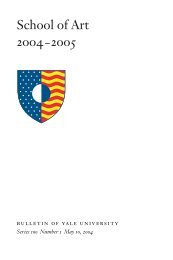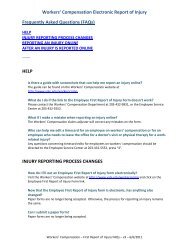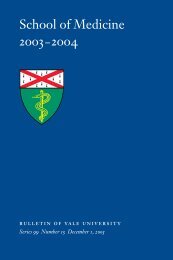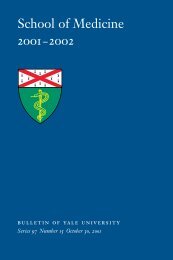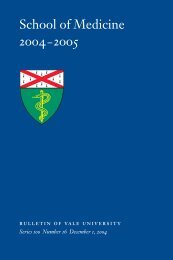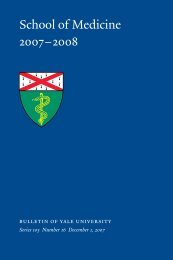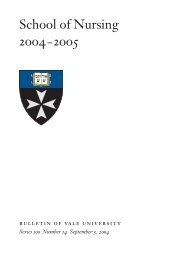100 School of Nursing721a/b, Scholarly Inquiry Praxis. No credits. The praxis, designed to be completed inthe final year of specialization, is designed to provide an opportunity to integrate knowledgeof <strong>nursing</strong> management, the health care environment, leadership, and scholarlyinquiry in the study of an important clinical problem. It is recommended that theprospectus, submitted as the final product of the small group seminar portion of 525b, beapproved by the end of September in the final year. The absolute deadline for anapproved prospectus is the end of the first term (December) of the final year. A grade ofat least Pass must be received in 721a prior to enrollment in 721b. Students must successfullycomplete both 721a and 721b in order to graduate. Required for all master’s students.P. Milone-Nuzzo, coordinator.723a (HPA 592a), Concepts and Principles of Aging. 1.5 credit hours. This electivecourse is designed as a multidisciplinary course that introduces students to the majorconcepts and principles of gerontology and to a variety of biopsychosocial theories onaging. Delivery systems of care for the elderly are explored along with the current socialpolicy initiatives as they relate to the elderly. Research initiatives are discussed and studentsare urged to explore issues of eldercare in their own specialty/discipline as well asin related disciplines. Required for gerontological nurse practitioner students. One andone-half hours per week. C. Lyder.725b, Health Care Ethics. 1.5 credit hours. Students are introduced to major ethicaltheories and their application in health care ethics. Theoretical perspectives and theirapplication to practice are discussed and different methods of analyzing ethical dilemmasin clinical practice are reviewed. International and multicultural perspectives in bioethicsare introduced. There is an application of the principles of autonomy, beneficence, nonmaleficence,and justice to clinical case studies. Specific topics include, but are notlimited to, informed consent, provider-patient relations, dilemmas at the end of life, andhealth care reform. Students learn to apply ethical principles to clinical practice, policyformation, and research. One and one-half hours per week. D. Olsen.[726a/b, Practicum in Clinical Ethics. 1.3 credit hours per term. Students participatein 120 hours of clinical ethics under the guidance of a nurse with advanced knowledge andexperience in the field and who is actively engaged in ethical consultation or evaluationof clinical situations. Emphasis is on gathering data from multiple sources involved in anethical dilemma; mediating ethical disputes; investigating human rights abuses; reportingthe results of mediation or investigation to institutions or authorities; ethical analysisof institutional policy; facilitating the discussion of ethics among providers, patients,and the lay public; and educational presentation of topics or cases in clinical ethics. Studentsparticipate in a monthly clinical conference. Prerequisite: successful completion of725b, Health Care Ethics, or permission of the instructor. Required for students in theHealth Care Ethics concentration. Four hours per week. D. Olsen. Not offered<strong>2002</strong>–2003.][727a, Analysis of Issues in Health Care Ethics. 1.5 credit hours. In this course studentslearn to develop and critique positions and arguments in health care ethics by
Course Listings 101developing a topic of interest into a formal paper. Papers are written through a processof mutual critique in order to develop arguments while simultaneously analyzing thework of others. Prerequisite: successful completion of 725b, Health Care Ethics, or permissionof the instructor. One and one-half hours per week. D. Olsen. Not offered fallterm <strong>2002</strong>.]729b,Alternative and Complementary Therapies. 1 credit hour. Alternative and complementarytherapies are medical interventions not usually taught in medical or <strong>nursing</strong>schools and are not generally available in U.S. hospitals. Despite the fact that such therapiesas herbs, vitamins, meditation, massage, acupuncture, and therapeutic touch areusually paid for by consumers, approximately one in three adults in the United Statesused such treatments in 1990. Neither advocates nor opponents can afford to remainignorant of the growing body of literature on the clinical and cost effectiveness of thesetherapies. This elective course offers the opportunity to examine the literature andto discuss the clinical implications of published studies. One hour per week. A. Ameling.[731a (RLST 976a), Spirituality in Health Care. 1.5 credit hours. A growing numberof Americans report that they pray daily and that they want their health care providers topray with them and for them. This elective course addresses this trend by providing anintroduction to the spiritual dimension of caring. Issues of health and illness, curing andcaring, the power of belief, and the spiritual healing practices of major religious traditionsare examined. The course has a multicultural and interdisciplinary focus and providesan introduction to spiritual assessment in health care settings. One and one-halfhours per week. A. Ameling, M. Lewis. Not offered fall term <strong>2002</strong>.]733b, Living with Dying. 1.5 credit hours. Advances in treatment and technology havetransformed the clinical course of many terminal illnesses. A growing number of peoplewith terminal illness are living longer than ever before. Home care, shorter length ofstay, and restrictions on admissions because of managed care have become a health caredelivery reality for individuals with even the most serious illnesses. Health care providersneed a comprehensive understanding of the individual and family experiences across anillness trajectory as clients adapt to living with disease and the possibility of death. Thiscourse develops practitioners’ cultural and gender awareness, understanding, and competenciesin creating environments to relieve suffering for individuals and their familiesacross settings. Emphasis is on nonpharmacologic interventions to relieve suffering,including spiritual, interpersonal, and sociocultural. The course is structured with thepremise that relief from suffering, meaning, and transcendence at the end of life are bestachieved and understood through the interpersonal use of narrative techniques, likestorytelling, to facilitate communication. One and one-half hours per week. A. Ameling.751a, Advanced Concepts in Women’s Health Care. 4.4 credit hours. This coursefocuses on topics that examine women’s health care in the context of their lives from theoreticaland clinical perspectives. Issues that confront women and their health careproviders are discussed from a multidisciplinary viewpoint incorporating both allopathicand complementary approaches. Specific areas of focus include antepartum care and
- Page 1 and 2:
School of Nursing2002-2003bulletin
- Page 3 and 4:
School of Nursing2002-2003bulletin
- Page 5 and 6:
RayTompkinsHouseLynw od PlaceHi lsi
- Page 7 and 8:
ContentsA Message from the Dean 7Ca
- Page 9 and 10:
A Message from the DeanCatherine Ly
- Page 11 and 12:
The President and Fellows of Yale U
- Page 13 and 14:
Faculty 11faculty* Ivy Marie Alexan
- Page 15 and 16:
Faculty 13Virginia Henderson, 1897-
- Page 17 and 18:
Faculty 15Ronald Angoff, m.d., Asso
- Page 19 and 20:
Faculty 17Stephen Malcolm Bowers, m
- Page 21 and 22:
Faculty 19Alyson Bochow Cohen, m.s.
- Page 23 and 24:
Faculty 21Kathleen Marie Demers, m.
- Page 25 and 26:
Faculty 23Carolyn Miller Federici,
- Page 27 and 28:
Faculty 25Marci Ann Garafalo, m.s.n
- Page 29 and 30:
Faculty 27Robert Wentworth Hill, m.
- Page 31 and 32:
Faculty 29Linda Kowalczuk, m.s., Cl
- Page 33 and 34:
Faculty 31Thomas J. McMahon, ph.d.,
- Page 35 and 36:
Faculty 33Moira Kathleen O’Neill,
- Page 37 and 38:
Faculty 35Monica Roosa-Ordway, m.s.
- Page 39 and 40:
Faculty 37Barney S. Spivack, m.d.,
- Page 41 and 42:
Faculty 39Elizabeth Arquin Walker,
- Page 43:
Faculty and Staff 41Elizabeth Willi
- Page 46 and 47:
44 School of NursingIn November 199
- Page 48 and 49:
CentersCenter for Excellence in Chr
- Page 51: Academic ProgramsPaula Milone-Nuzzo
- Page 54 and 55: 52 School of Nursinggeneral enrollm
- Page 56 and 57: 54 School of NursingInternational s
- Page 58 and 59: 56 School of NursingArticulated Mas
- Page 60 and 61: 58 School of Nursingthe specialty a
- Page 62 and 63: 60 School of NursingYear OneRequire
- Page 64 and 65: 62 School of Nursingadult, family,
- Page 66 and 67: 64 School of NursingDuring the fina
- Page 68 and 69: 66 School of NursingYear TwoRequire
- Page 70 and 71: 68 School of NursingYear OneRequire
- Page 72 and 73: 70 School of NursingThe course plan
- Page 74 and 75: 72 School of Nursingand advanced pr
- Page 76 and 77: 74 School of Nursingpsychiatric-men
- Page 79 and 80: Doctor of Nursing Science Programai
- Page 81 and 82: Doctor of Nursing Science Program 7
- Page 83 and 84: Doctor of Nursing Science Program 8
- Page 85: Postdoctoral Training Program 83qua
- Page 88 and 89: 86 School of Nursing[923a, Current
- Page 90 and 91: 88 School of Nursing512c, Clinical
- Page 92 and 93: 90 School of Nursingresearch plans.
- Page 94 and 95: 92 School of Nursing564a, which foc
- Page 96 and 97: 94 School of Nursingper week for ac
- Page 98 and 99: 96 School of Nursingpractitioner, f
- Page 100 and 101: 98 School of Nursingdevelopment are
- Page 104 and 105: 102 School of Nursingmanagement of
- Page 106 and 107: 104 School of Nursing769a, Advanced
- Page 108 and 109: 106 School of Nursing8o3a/b, Oncolo
- Page 110 and 111: 108 School of Nursing827a, Pathophy
- Page 112 and 113: 110 School of Nursingassumption und
- Page 114 and 115: 112 School of Nursing9o3a, Measurem
- Page 116 and 117: 114 School of Nursing[921b, Seminar
- Page 119 and 120: General Informationtuition, special
- Page 121 and 122: General Information 1192. If the ch
- Page 123 and 124: General Information 121As an altern
- Page 125 and 126: General Information 123include Ethe
- Page 127 and 128: General Information 125In addition,
- Page 129 and 130: General Information 127Eligibility
- Page 131 and 132: General Information 129The School o
- Page 133: General Information 131OISS by subs
- Page 136 and 137: 134 School of NursingThe Connecticu
- Page 138 and 139: 136 School of Nursingmedical and pe
- Page 140 and 141: 138 School of Nursingcare, and home
- Page 142 and 143: 140 School of NursingConnecticut Ch
- Page 144 and 145: 142 School of NursingInternal Medic
- Page 146 and 147: 144 School of NursingRehabilitation
- Page 149 and 150: University ResourceslibrariesThe ma
- Page 151 and 152: University Resources 149may use the
- Page 153 and 154:
Candidates for Degree of Masterof S
- Page 155 and 156:
Master’s Degree Candidates 153Sar
- Page 157 and 158:
Distribution of GraduatesAlumni rec
- Page 159 and 160:
The Work of Yale UniversityThe work
- Page 161 and 162:
Index of CoursesAdult Development:
- Page 163 and 164:
Index of Courses 161Oncology Sympto
- Page 165 and 166:
The University is committed to basi




